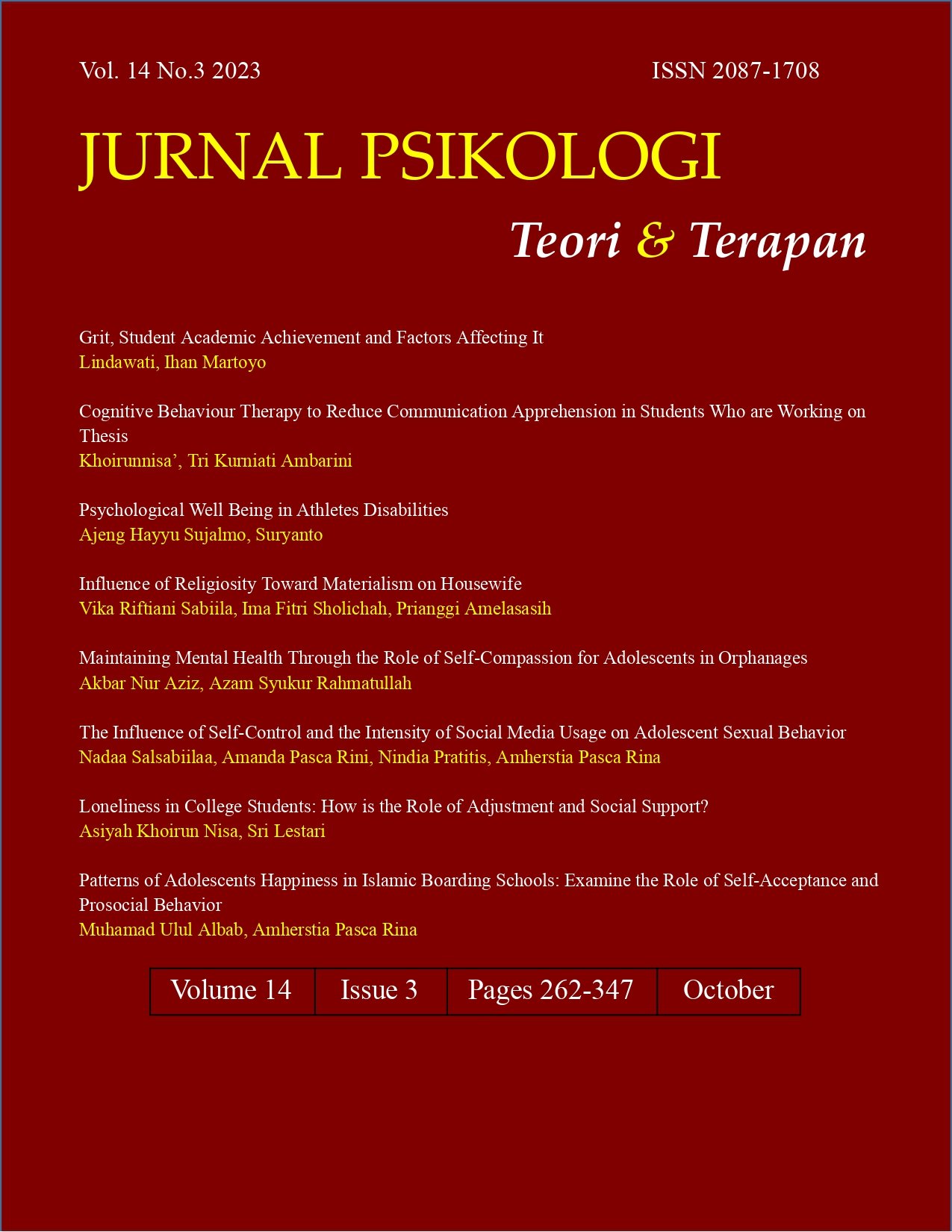Grit, Student Academic Achievement and Factors Affecting It
DOI:
https://doi.org/10.26740/jptt.v14n03.p262-269Keywords:
Academic achievement, college student, GPA, grit, Prestasi akademis, mahasiswa, IPK, geregetAbstract
Grit has been shown to be a more influential predictor of success than mere cognitive ability. Research on Grit is still minimal in Indonesia and is often descriptive in nature and does not specifically target student academic achievement. This study aims to fill this gap to reveal the interaction between Grit and student academic achievement. In addition, several aspects of student life were also observed to see their influence on Grit, including length of study, the number of students’ work obligation hours, and the amount of social media/TV consumption. The research was conducted using the Grit Scale. Purposive sampling was used to collect data from 763 students from the Faculty of Teacher College, Universitas Pelita Harapan, with an age range of 18-22 years from 3 years of class and 4 study programs. Correlation and regression results show that Grit is associated with student academic achievement (r=.14, p<.01), and can predict student academic achievement significantly (β=.14, p<.001). In addition, there was also an increase in Grit scores from the second, to the third, and the fourth-year students. The amount of students’ work obligation was found to be a positive predictor of Grit, while the amount of social media/TV consumption was a negative predictor. The implications of this research and the factors that influence students’ Grit will be discussed further.
ABSTRAK
Gereget (inggris: Grit) telah ditunjukkan sebagai prediktor keberhasilan yang lebih berpengaruh daripada kemampuan kognitif semata. Namun demikian, penelitian tentang Gereget masih minim di Indonesia dan sering bersifat deskriptif dan tidak menyasar secara khusus ke prestasi akademis mahasiswa. Penelitian ini bertujuan mengisi celah ini untuk mengungkap interaksi antara Gereget dan prestasi akademis mahasiswa. Sebagai tambahan, beberapa aspek kehidupan mahasiswa juga diamati pengaruhnya terhadap Gereget, termasuk lama studi, jumlah pemenuhan jam wajib kerja mahasiswa, dan jumlah konsumsi media sosial/TV. Penelitian kuantitatif dilakukan dengan menggunakan Skala Gereget (Grit-Scale). Purposive sampling digunakan untuk mengambil data dari 763 mahasiswa Fakultas Pendidikan Guru, Universitas Pelita Harapan, dengan rentang umur 18-22 tahun yang berasal dari 3 tahun angkatan dan 4 program studi. Hasil korelasi dan regresi menunjukkan bahwa Gereget berhubungan dengan prestasi akademis mahasiswa (r=.14, p<.01), dan dapat memprediksi prestasi akademis mahasiswa secara signifikan (β=.14, p<.001). Selain itu, juga ditemukan peningkatan nilai Gereget dari mahasiswa tahun kedua, ke tahun ketiga dan keempat. Jumlah jam wajib kerja mahasiswa ditemukan sebagai prediktor positif terhadap Gereget, sedangkan jumlah konsumsi media sosial/TV adalah prediktor negatif. Implikasi penelitian ini dan faktor-faktor yang mempengaruhi Geregetnya mahasiswa akan didiskusikan lebih jauh.
References
Duckworth, A. L., Peterson, C., Matthews, M. D., & Kelly, D. R. (2007). Grit: perseverance and passion for long-term goals. Journal of Personality and Social Psychology, 92(6), 1087. https://doi.org/10.1037/0022-3514.92.6.1087
Muenks, K., Yang, J. S., & Wigfield, A. (2018). Associations between grit, motivation, and achievement in high school students. Motivation Science, 4(2), 158. https://doi.org/10.1037/mot0000076
Ponnock, A., Muenks, K., Morell, M., Yang, J. S., Gladstone, J. R., & Wigfield, A. (2020). Grit and conscientiousness: Another jangle fallacy. Journal of Research in Personality, 89(10402), 1. https://doi.org/10.1016/j.jrp.2020.104021
Southwick, D. A., Tsay, C. J., & Duckworth, A. L. (2019). Grit at work. Research in Organizational Behavior, 39(10012), 6. https://doi.org/10.1016/j.riob.2020.100126
Wahidah, N., & Rohmah, F. (2021). Grit on Students in Indonesia. Technium Soc. Sci. J., 22, 385.
Zhang, T., Park, D., Ungar, L. H., Tsukayama, E., Luo, L., & Duckworth, A. L. (2022). The development of grit and growth mindset in Chinese children. Journal of Experimental Child Psychology, 221, 10545. https://doi.org/10.1016/j.jecp.2022.105450
Downloads
Published
How to Cite
Issue
Section
License

This work is licensed under a Creative Commons Attribution-NonCommercial 4.0 International License.
Authors who publish in this journal agree to the following terms:
Copyright in any article is held by the author.
The author grants the journal, publication rights with the work simultaneously licensed under a Creative Commons Attribution License that allows others to share the work with an acknowledgment of the work's authorship and initial publication in this journal.
Authors may enter into separate, additional contractual arrangements for the non-exclusive distribution of the journal's published version of the work (e.g., posting it to an institutional repository or publishing it in a book), with an acknowledgment of its initial publication in this journal.
Authors are permitted and encouraged to post their work online (e.g., in an institutional repository or on their website) prior to and during the submission process, as this can lead to productive exchanges, as well as earlier and greater citation of published work.
 Abstract views: 1561
,
Abstract views: 1561
, PDF Downloads: 1393
PDF Downloads: 1393


















